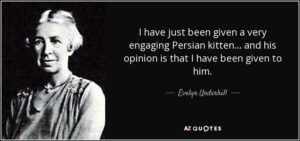As the last contribution from Evelyn Underhill’s letters, I couldn’t resist part of her correspondence to C. S. Lewis about animals –
She begins by commenting on some of his ideas from his book The Problem of Pain and how for her Christianity does not explain suffering, but does show us what to do with it. Rather than attributing all the evil and pain of creation to humanity’s rebellious will, she senses a fundamental disharmony between creation and God. But the point where she firmly disagrees with Lewis is about his chapter on animals where she takes exception to his idea that ‘The tame animal is in the deepest sense the only natural animal … the beasts are to be understood only in their relation to man and through man to God.’
Evelyn comments that this seems an intolerable doctrine and a frightful exaggeration in what might be involved in the so-called primacy of man.
‘… is the cow which we have turned into a milk machine or the hen we have turned into an egg machine really nearer the mind of God than its wild ancestor? … You surely can’t mean that, or think that the robin redbreast in a cage doesn’t put heaven in a rage but is regarded as an excellent arrangement.’
She lambasts his illustration of the family home plus family dog as smug and utilitarian, comparing it to ‘the wild beauty of God’s creative action in the wild jungle and deep sea. Adding:
‘And if we ever get a sideways glimpse of the animal-in-itself, the animal existing for God’s glory and pleasure and lit by His light (and what a lovely experience that is!) we don’t owe it to the Pekinese, the Persian cat or the canary, but to some wild free creature living in completeness of adjustment to nature a life that is utterly independent of man. And this, thank heaven, is the situation of all but a handful of creatures we have enslaved. Of course I agree that animals too are involved in the Fall and await redemption and transfiguration.’
Transfiguration can never come by taming though, but rather by loving and reverencing the creatures enough to leave them free – and we might add now by not destroying their habitats.
‘When my cat goes off on her own occasions I’m sure she goes with God – but I do not feel so sure of her theological position when she is sitting on the best chair before the drawing-room fire. Perhaps what it all comes to is this, that I feel your concept of God would be improved by just a touch of wildness.’
The second verse of a poem by Evelyn Underhill called Immanence seems to express this relationship between God and animals:
‘I come in the little things,
Saith the Lord;
Yea, on the glancing wings
Of eager birds, the soft and pattering feet
Of furred and gentle beasts, I come to meet
Your hard and wayward heart. In brown bright eyes
That peep from out the brake, I stand confest.
On every nest
Where feathery Patience is content to brood
And leaves her pleasure for the high emprise
Of motherhood—
There does my Godhead rest.’
